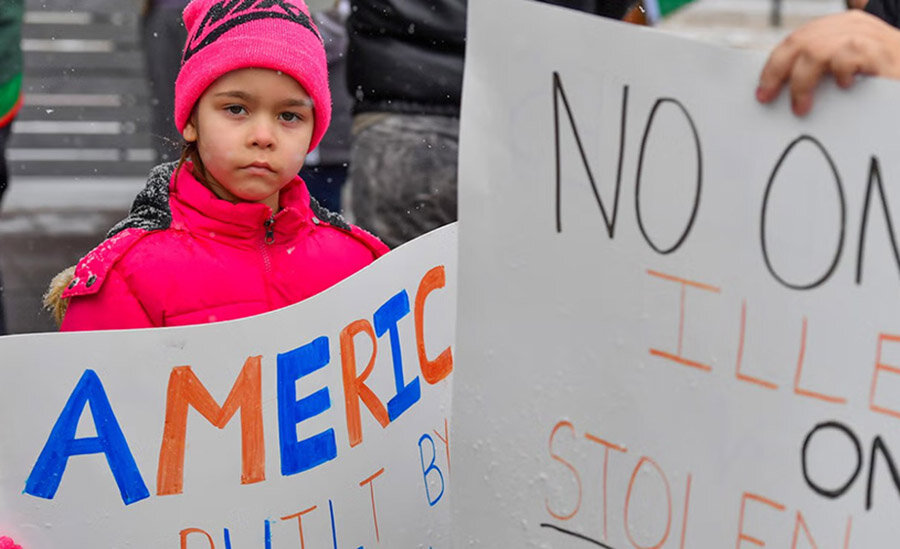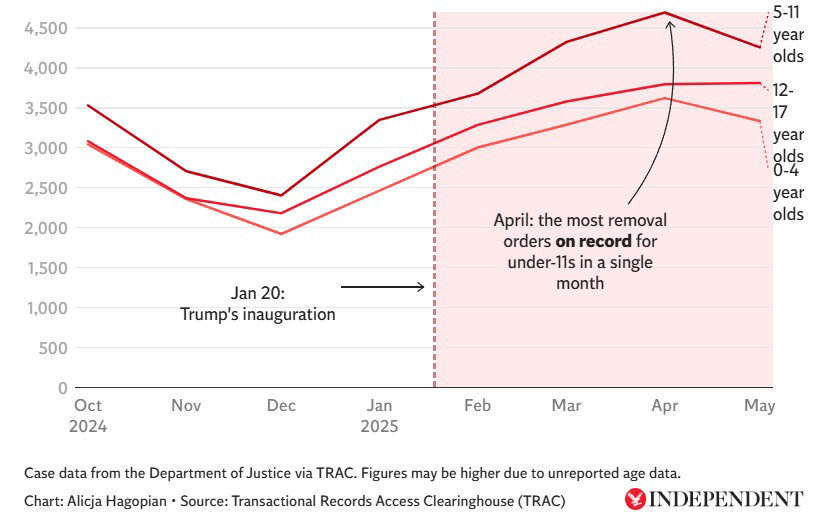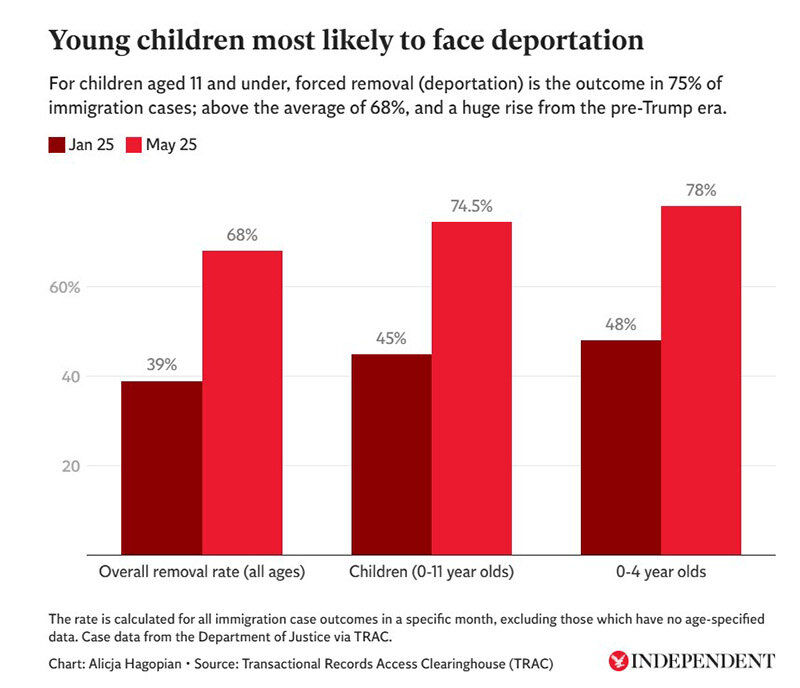U.S. Deports Record Number of Migrant Children: Consequences of Trump’s Reforms

Photo: Independent.
U.S. immigration policy has come under intense scrutiny following reports of a sharp increase in deportation orders issued to minors. According to The Independent, in April 2025 alone, over 8,300 children under the age of 11 received court orders for removal—a record high since data collection began in 1989.
Since January, when Donald Trump began his second presidential term, courts have ordered the deportation of more than 53,000 minors. This group includes around 15,000 children under four years old and another 20,000 between the ages of 4 and 11. Teenagers aged 12–17 are also being deported, numbering 17,000, though this figure has not yet surpassed the peaks seen during Trump’s first administration.

In most cases, children lack legal representation—recent data shows that 76% of children under 11 do not have an attorney. Meanwhile, cases are moving faster: so-called rocket dockets allow proceedings to be completed in as little as two weeks, leaving virtually no time to prepare an adequate defense. In May, 75% of children under 11 received removal orders, and among those under four, the figure was 78%, significantly higher than the rates seen in January (45%).

The Independent notes that minors represent only 11% of all undocumented migrants, yet they account for 26% of those deported since January. This means children are deported at 2.3 times the rate expected based on demographics, which experts interpret as deliberate targeting.
Some children, including six-year-olds, are arrested together with their parents but are then separated and deported alone. One such child spent four months in detention without access to legal assistance because government funding for such programs had been suspended. Children become victims of arbitrary decisions in the absence of consistent procedures.
Human rights advocates express concern not only about the numbers but also about the procedures. Young children, including those with developmental disabilities, are required to appear personally in immigration court and respond to judges’ questions. One case described by The Independent involved a child from Haiti with learning disabilities who attended a hearing via video link and did not understand the proceedings. At one point, he pointed at the screen and asked, “Who is that?”
A representative of the Department of Homeland Security stated that ICE “does not target children” and “does not deport them separately,” asserting that when parents are detained, they are asked whether they wish to leave the country with their children or leave them with a trusted person. However, human rights defenders emphasize that, in practice, children increasingly face the system alone, unaware of their rights and without the means to access legal protections guaranteed by law.
Adding to the concern is the Trump administration’s attempt to eliminate government funding for legal aid for unaccompanied children. Initially suspended, the funding was canceled in March, only for a federal court to order its reinstatement in April, citing violations of the TVPRA law. However, legal organizations warn that they remain “on edge” because the administration has appealed the decision, and the new Trump’s Big Beautiful Bill complicates the ability to challenge such initiatives.
It’s worth noting that since the start of Donald Trump’s second term, the U.S. has radically changed its approach to migration policy. On inauguration day, January 20, 2025, the White House declared a state of emergency on the southern border and effectively closed it to new asylum seekers. At the same time, the CBP One app, which migrants used to schedule legal border crossings, was shut down—all pending appointments were canceled. During the same period, the “Remain in Mexico” policy was reinstated, forcing asylum seekers to wait outside the U.S. while their cases are processed.
Immigration courts nationwide shifted to accelerated hearings (rocket dockets). Cases are now resolved within days, sometimes under a week. Many migrants have no time to secure legal counsel or prepare documentation. Such expedited processes are even applied to children and other vulnerable groups.
According to Time, from January through the end of April 2025, over 207,000 people were deported. More than 100,000 migrants were arrested, and approximately 56,000 were held in detention facilities—exceeding capacity limits. By summer, the U.S. had reached record levels of deportations. In June alone, there were 209 deportation flights, 54% higher than the monthly average in prior months, reports El Pais.
To implement the new approach, a large legislative package known unofficially as the One Big Beautiful Bill was adopted, reports Reuters. It allocates $170 billion to strengthen immigration enforcement, including $45 billion for 100,000 new detention beds, $46.5 billion for building a border wall with Mexico, and additional funding for raids and ICE staff expansion.
One of the most controversial measures was an internal ICE memorandum dated July 8, eliminating the automatic scheduling of bond hearings. Now, the decision on temporary release is made not by a judge but by immigration agents, depriving many detainees of the right to judicial review. Furthermore, ICE has been granted the authority to deport migrants not only to their home countries but also to third countries. Deportation notices can now be issued with as little as six hours’ notice. Previously considered exceptional, this practice is now applied routinely.
Since the start of 2025, the U.S. immigration system has undergone significant changes. Humanitarian pathways have been dismantled, case processing has accelerated, and agency discretion has expanded considerably. In this environment, access to protection for vulnerable groups—including minors—has become severely restricted, raising alarm among human rights organizations. Lawyers and advocates describe the situation as “performative cruelty” and “an attempt to instill fear.” They argue that children are being used as a political tool in the fight against illegal immigration, without regard for their age, condition, or personal history.
Подсказки: US immigration, migrant children, deportations, Trump policies, ICE, asylum, legal aid, border security








